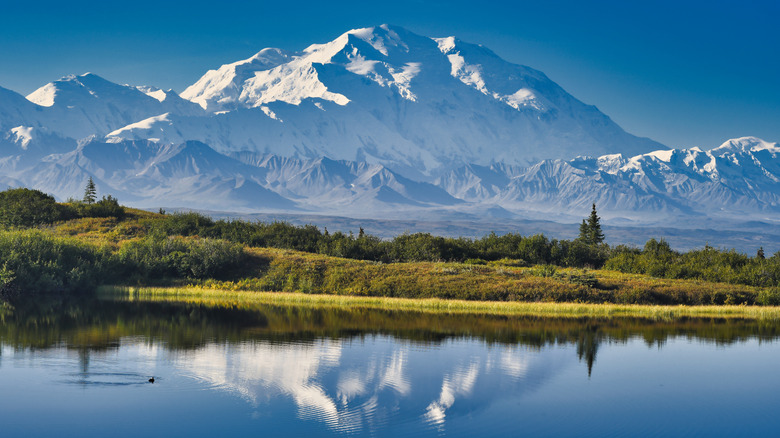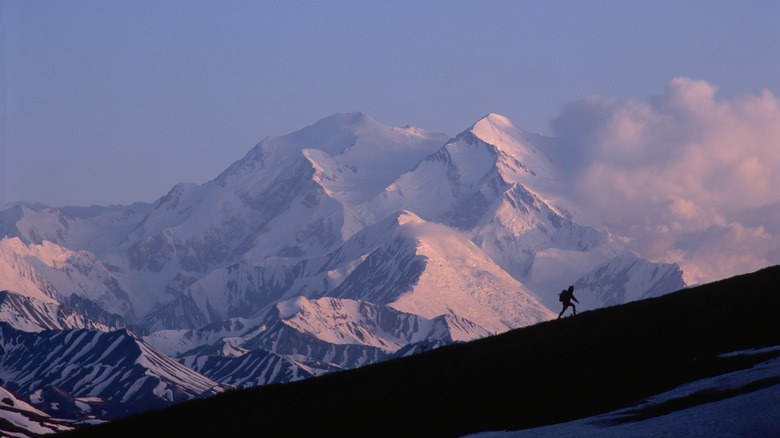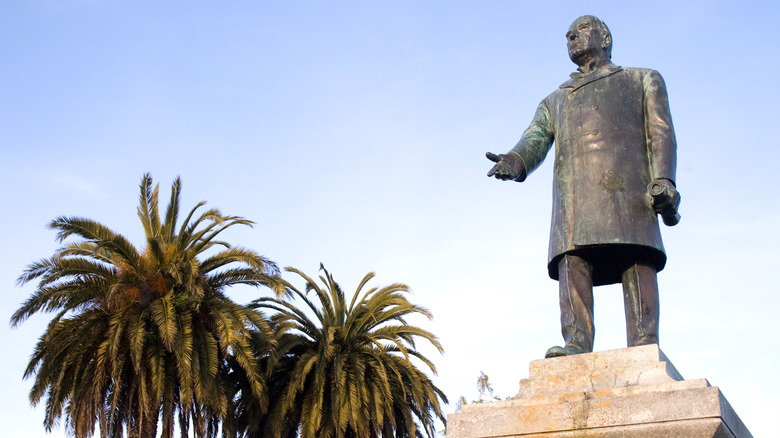The Historic Reason Mountain Climbers Won't Be Calling America's Highest Peak By Its New Official Name
In an executive order issued on January 20, 2025, President Donald Trump declared that the name of Alaska's 20,310-foot-high mountain, Denali, would be changed to Mount McKinley. This decision accompanied his other controversial push to change the name of the Gulf of Mexico, a move the president is describing as "restoring names that honor American greatness."
The highest peak in North America, situated in an underrated, mountainous national park, was formerly named for President William McKinley, who served as US leader from 1897 to 1901. The name was given by a prospector and New York Sun contributor who visited the Alaskan wilds in 1896. He failed to ask any Alaskans what it was called before announcing his own nomenclature as fact, but it was already named Denali, or "the high one" by the Athabaskans, whose history harks back to the first Americans to arrive on the ice bridge from Siberia in 10,000 BC. The presidential naming persisted until 2015, when President Obama formally recognized the native name as a gesture of good will towards the Native people of Alaska.
Choosing to restore the name of a president who participated in colonial conquests that harmed Native Americans, rather than respecting the names of its Indigenous settlers, provokes the question of which historical figures the US government believes to be representative of "American greatness." This question has provoked a strong response from the outdoor travel and climbing communities, as reporter Jayme Moye evidences in recent interviews for Outside.
Outdoor professionals reject Denali's name change
Denali inspires the most intrepid of adventurers. It's the highest mountain in the US. A national park where you're almost guaranteed to see a bear, prone to high-speed winds and freezing climbs. It is the third most isolated peak on earth, riddled with sneaky dangers that make climbing the iconic Mount Denali so risky. The climbers that have faced its crag have dedicated their bodies and their lifetimes to their love of the land. These passionate Alaskan experts are outspokenly agitated by the president's suggestion.
Mark Westman, who spent a decade as a Denali Mountaineering Ranger, told Outside, "in the climbing community, [the name Denali is] almost universal — I almost never hear anybody call it McKinley." Twenty-five-time summiteer Dave Hahn noted that "Denali is truer to where the mountain is, and who the people around the mountain are, recognizing that it's an Alaskan mountain and not a Washington D.C. mountain", corroborated by climber Conrad Anker, who believes "it was fitting to honor the people of Alaska with the rightful name."
Though each of the experts interviewed by Outside offered their own perspective, they were united on one point: they won't be calling it McKinley. Author and outdoorsman Jon Krakauer said that "Trump might be able to officially rename it, but he will never be able to force me to call it anything except Denali". Keith Sidle, Alaska Mountaineering School teacher, agreed. "It's changing a name on a piece of paper, it's not changing the mountain ... to the people that it really matters to, it's not changing anything."
Denali's new namesake invokes additional controversy
Honoring President McKinley as the mountain's namesake has revived conversations surrounding controversial statues of the former leader in California, Hawaii, and Illinois. His statue was removed from a plaza in Arcata, California in 2019, decried as a monument to "imperialism, white supremacy, and genocide." While some could argue these characteristics could be applied to just about any overseer of the annexation of Native land in North America, Indigenous grievances with President McKinley in particular drove more than 70 organizations to lobby in support of the statue's removal.
These campaigners cited McKinley's continuation of policies they said were designed to displace, discriminate against, and abuse Native Americans in their argument for removing symbols lauding the former president. They highlighted his signing of the 1898 Curtis Act, stripping the Five Civilized Tribes of their sovereign status, reneging on yet more treaties, abolishing tribal governments, and invalidating their systems of law. As a consequence of revoking the rights of the tribes, and their sovereignty over an estimated 90 million acres of country, some of the last protected Native land in the US was snatched by white settlers. The president also finalized the colonial annexation of Hawaii and expanded his imperial conquests to Puerto Rico, Guam, and the Philippines.
Continuing his statement to Outside, Westman mentioned the inappropriate namesake candidate. "Native Alaskans were calling it Denali for thousands of years before anybody else came here ... the name Denali reflects a local cultural heritage here that predates the United States [while] the name McKinley was an arbitrary name given for someone who never even set foot here. He was from Ohio."


